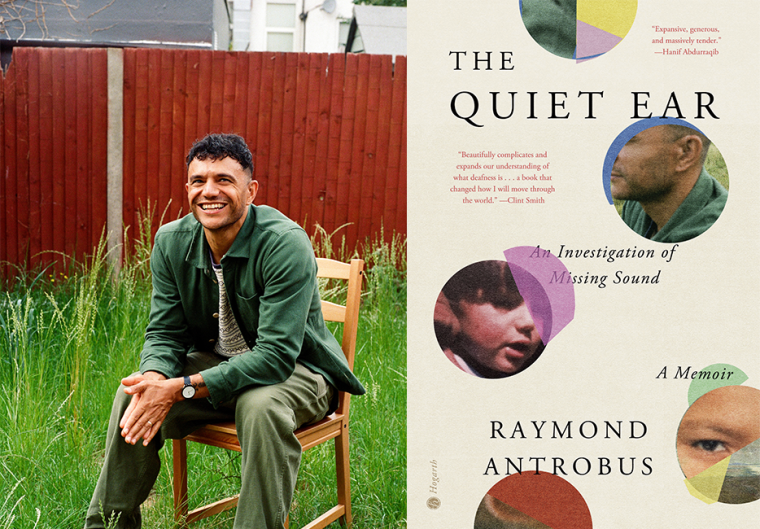This week’s installment of Ten Questions features Raymond Antrobus, whose memoir The Quiet Ear: An Investigation of Missing Sound, is out today from Hogarth. The Quiet Ear is an exploration of deafness that blends memoir, cultural history, and a call to action. Antrobus was first diagnosed as deaf at the age of six when he discovered he had missed sounds, like birds, whistles, kettles, and alarms. Teachers thought he was slow and disruptive, and some didn’t believe he was deaf at all. The Quiet Ear tells the story of Antrobus’s childhood at the intersection of race and disability. He grew up in East London, was raised by an English mother and Jamaican father, and was educated in both mainstream and Deaf education systems. Throughout the memoir, Antrobus explores the shame of miscommunication and the joy of finding community, setting his story alongside those of other D/deaf cultural figures, from painters to silent film stars to poets and performers. Hanif Abdurraqib called the memoir “expansive, generous, and massively tender.” Safiya Sinclair wrote that The Quiet Ear is a “litany to beauty beyond what it is spoken,” adding: “This book is an essential education.” Raymond Antrobus is the author of three collections of poetry, most recently Signs, Music (Tin House Books, 2024), of which the title poem was published in the New Yorker. His work has won numerous prizes in the U.K., where his poems are frequently taught in schools. Antrobus was elected a Fellow of the Royal Society of Literature and lives in London.

Raymond Antrobus, author of The Quiet Ear: An Investigation of Missing Sound. (Credit: Lily Bertrand-Webb)
1. How long did it take you to write The Quiet Ear: An Investigation of Missing Sound?
Around six years after many false starts. I was unsure of how to structure it; I just knew I wanted to explore long-form nonfiction prose as a poet.
2. What was the most challenging thing about writing the book?
Probably doing months of writing that went off in a direction that ended up not serving the book I was trying to write but did land me back in therapy. As well as that, the usual work-balance stuff around parenting and writing was a real challenge.
3. Where, when, and how often do you write?
I usually write poems on the go, in public places, trains and coffee shops mainly, and in the morning. I try to write something every day. Right now I’m writing mainly poems, as I’m moving around a lot for teaching and in preparation for the book tour. I found that I needed to be more situated in one place when writing prose.
4. What are you reading right now?
Currently I’m reading a book of essays by Sri Lankan American writer and comic book artist Hasanthika Sirisena called Dark Tourist and a poetry collection called The Blue Mimes by Cuban-Peruvian American poet Sara Daniele Rivera.
5. Which author, in your opinion, deserves wider recognition?
Poets. Recently I have been raving about John Lee Clark, Zaffer Kunial, Alejandro Zambra, and Marwa Helal.
6. What is the biggest impediment to your writing life?
I mean, I’m a parent, so strict structured time for anything outside of that is a challenge. As well as that, I sometimes have chronic levels of procrastination to fight through.
7. What is one thing that your agent or editor told you during the process of publishing this book that stuck with you?
“It is the right time to tell this story.”
8. If you could go back in time and talk to the earlier you, before you started The Quiet Ear, what would you say?
This will be the hardest thing you’ve written yet; check in with your therapist a bit more frequently.
9. Outside of writing, what other forms of work were essential to the creation of The Quiet Ear?
Visual arts. I needed time away from text to indulge in paintings and drawings and collage art. I spent a lot of days in art galleries mulling over my memories and the text I was writing. It was essential. Also, cinema—losing myself in a dark room, sitting still and immersed in a story outside of my own.
10. What’s the best piece of writing advice you’ve ever heard?
I’ve had a lot of good advice from mentors and elders over the years. I remember meeting Kwame Dawes and rambling about some ideas for the book I was trying to write at that time, and he cut me off when I disclosed that I hadn’t started writing it. “You’re overthinking, sit down and write it!” I responded well to his demand.







